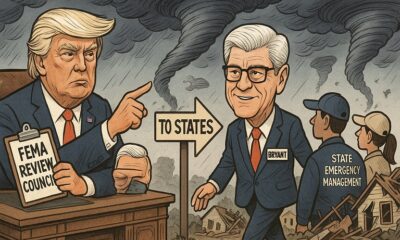News from the South - Missouri News Feed
St. Louis news | Aug. 4 | 5 p.m. update | Saint Louis Public Schools leadership turmoil continues
SUMMARY: In St. Louis Public Schools, an ongoing leadership shakeup is unfolding as Superintendent Kesha Scarlet was placed on temporary leave, just weeks before the new school year begins. Her replacement, Millison Borade, has a troubled history, including a vote of no confidence from her previous district due to micromanagement and lack of collaboration. Mayor Tashara Jones is calling for a state audit of the school district’s finances, highlighting a concerning shift from a $17 million surplus to a projected $35 million deficit. The school board is focused on preparations for the August 19 school start, amidst rising community concerns.

Get the latest St. Louis news, weather and sports: https://www.ksdk.com
Follow us on Facebook: https://www.facebook.com/ksdktv
Follow us on X: https://www.x.com/ksdknews
Download the 5 On Your Side app: https://www.ksdk.com/app
To watch 5 On Your Side broadcasts or reports 24/7, 5 On Your Side is always streaming on 5+. Download for free on Roku (http://bit.ly/3XxQuEZ), Amazon Fire TV (https://bit.ly/3YZZsw7) or the Apple TV App Store.
News from the South - Missouri News Feed
STL Veg Girl shares the health benefits of gluten-free everything red lentil drop biscuits!
SUMMARY: STL Veg Girl shares the health benefits of gluten-free red lentil drop biscuits, highlighting lentils as a nutritious, plant-based, and creamy ingredient perfect for beginners adding plants to their diet. The recipe involves soaking red lentils, blending them with lemon, broth, husk (a plant-based gluten substitute), and baking soda to create a thick dough. These biscuits, seasoned with options like Italian herbs or everything bagel seasoning, bake in the oven and freeze well. They are dense yet tasty and offer the “second meal effect,” helping stabilize blood sugar and prolong fullness, making them excellent for weight management and satiety.

ST. LOUIS – Owner of STL Veg Girl, Caryn Dugan, has the perfect recipe for a meal that has a variety of health benefits, such as helping you feel fuller longer, reducing blood sugar spikes, and improving your body’s response to the next meal.
News from the South - Missouri News Feed
Bill on the Road | Long-time St. Louis radio broadcaster Bill Clevlen joins TISL+ to talk road trips
SUMMARY: Bill Clevlen, a long-time St. Louis radio broadcaster, shares his passion for road trips on TISL+. Known for his extensive travel, Bill has driven over 222,000 miles across the lower 48 states and explores domestic travel opportunities. Living in St. Louis offers easy access to exciting destinations like Indianapolis, Chicago, and Nashville—all just a few hours away. Bill highlights small-town gems like Arc Colola, Illinois, birthplace of Raggedy Ann, and Springfield with its Lincoln history and Route 66 attractions. His travel advice? Slow down and enjoy the journey by stopping at roadside attractions and small towns to make the most of your trip.

Bill says you shouldn’t just go from point A to point B. Stop in the middle, slow down, and make the most of your trip.
News from the South - Missouri News Feed
Attorney General Andrew Bailey demands records from Missouri abortion nonprofit
by Anna Spoerre, Missouri Independent
April 29, 2025
A judge on Monday temporarily blocked Missouri Attorney General’s subpoena seeking records from a nonprofit that assists women seeking abortions.
Bailey’s office issued the subpoena to Missouri Abortion Fund demanding it turn over years’ worth of documents as part of a lawsuit his office filed against Planned Parenthood more than a year ago.
The lawsuit is based on a video published by Project Veritas which depicts a man entering a Planned Parenthood clinic in Kansas City asking for help accessing abortion for his fictional underage niece.
Missouri Abortion Fund, a nonprofit that helps financially support Missourians who can’t afford the cost of abortion, is not a party in the case, nor is the group mentioned or depicted in the Project Veritas video.
Despite that, the organization received a subpoena on March 19 from Bailey’s office demanding it turn over any records involving minors seeking abortions, including any communications with Planned Parenthood Great Plains.
Jess Lambrecht, executive director of Missouri Abortion Fund, said while the organization believes minors should have full access to abortion, Missouri laws prevent it. Missouri Abortion Fund also does not currently pay for travel or lodging for anyone seeking financial support for an abortion, she said.
Missouri AG sues Planned Parenthood over Project Veritas video involving fictional girl
Elad Gross, an attorney representing Missouri Abortion Fund, called the subpoena “an abuse of government power” and a “fishing expedition.” Gross ran unsuccessfully against Bailey for attorney general last November.
Turning over the requested documents would “impose significant burden, expense, annoyance and oppression” on the nonprofit, which is run by two full time and one part-time staff members, as well as a board of volunteers, Gross wrote in court filings.
The organization estimated it would take more than 2,900 hours to sort through the 35,000 records needed to fulfill the request. This would “substantially interfere with the day-to-day operations of Missouri Abortion Fund and impose heavy financial costs on the organization,” Gross wrote in a request that the judge quash the subpoena.
Assistant Attorney General Caleb Rutledge in court records accused Missouri Abortion Fund of “an abuse of discretion” for failing to turn over the documents in the 2-week timeline the attorney general’s office set.
At a hearing Monday, Boone County Judge J. Hasbrouck Jacobs temporarily halted Bailey’s attempt to get the Missouri Abortion Fund records. The issue has been tabled until a later date.
Lambrecht said while the judge’s decision brought some short-term relief, she still fears a financial burden in the long-term that ultimately “harms and hinders” Missourians who seek help getting abortions paid for.
“We know that the AG’s office will stop at nothing to make accessing abortion impossible, if not exponentially difficult,” Lambrecht said after the hearing.
Jacobs on Monday also denied Planned Parenthood’s second request that the lawsuit be dismissed.
At the crux of the case is an accusation by Bailey’s office alleging Planned Parenthood Great Plains, which oversees clinics in Kansas City and Columbia, is transporting minors out of state for abortions.
The lawsuit was filed based on an undercover video filmed by a man affiliated with a right-wing group pretending to be the uncle of a 13-year-old in need of an abortion whose parents couldn’t know.
The videos do not involve, reference or depict Missouri Abortion Fund.
Bailey filed the initial lawsuit in February 2024.
A Missouri teen spent her life in foster care. Now she’s fighting the state to keep her baby
At a hearing last June, Planned Parenthood also asked that the judge dismiss the case on the merits that the video was “fictitious.” The judge denied the initial request.
Last November, Missourians narrowly voted to codify the right to reproductive health care, including abortion, in the state constitution. A few months later, Planned Parenthood again requested the judge drop the case.
The video surrounding the lawsuit remains “heavily disputed and completely hypothetical,” Planned Parenthood attorney Eleanor Spottswood said Monday. But in light of the abortion-rights amendment passing, she argued, the issue should be dropped.
“Everything the state alleges Great Plains did is now protected explicitly by the Constitution,” she said.
Lawyers with the attorney general’s office argued Monday that the issue was still relevant, in part, because Amendment 3 couldn’t be applied retroactively.
The AG’s office also argued that the state doesn’t believe the abortion-rights amendment lifted the state’s parental consent laws for minors seeking abortions.
Jacobs ultimately agreed.
“My concern is over the parental rights issue,” he said.
In the video filmed at the Kansas City clinic, the man secretly taping the interaction for Project Veritas told the Planned Parenthood employees the fictional girl’s parents couldn’t know about the abortion. Staff then directed him to their affiliate clinics in Kansas where they said he could “bypass” parental consent.
When the man asked how often girls go out of state for abortions, the Planned Parenthood employee said it happens “every day.”
A spokesperson for Planned Parenthood Great Plains said last year that they do not provide any form of transportation directly to any patients, regardless of age or where they live. They also described the video, taken without staff’s knowledge, as “heavily doctored and edited.”
Missouri law, written prior to the state’s trigger law banning abortions going into place and prior to the reproductive-rights amendment passing two years later, states: “No one shall intentionally cause aid or assist a minor to obtain an abortion.”
Missouri doesn’t have explicit laws requiring parental consent for minors getting abortions in other states, nor does it prohibit minors from going to other states to get abortions.
The issue of parental rights is expected to be litigated at a future date.
GET THE MORNING HEADLINES.
Missouri Independent is part of States Newsroom, a nonprofit news network supported by grants and a coalition of donors as a 501c(3) public charity. Missouri Independent maintains editorial independence. Contact Editor Jason Hancock for questions: info@missouriindependent.com.
The post Attorney General Andrew Bailey demands records from Missouri abortion nonprofit appeared first on missouriindependent.com
Note: The following A.I. based commentary is not part of the original article, reproduced above, but is offered in the hopes that it will promote greater media literacy and critical thinking, by making any potential bias more visible to the reader –Staff Editor.
Political Bias Rating: Center-Right
The content primarily focuses on legal proceedings surrounding Missouri Attorney General Andrew Bailey’s subpoena of the Missouri Abortion Fund as part of a lawsuit against Planned Parenthood. The article highlights opposition from abortion rights advocates and concerns about government overreach. The presence of references to right-wing-affiliated Project Veritas, as well as the context of a legal battle that directly involves abortion restrictions, indicates a Center-Right bias. The subject matter aligns with conservative legal and policy perspectives regarding abortion, parental consent, and state enforcement of abortion laws, making the article lean slightly rightward.
-

 News from the South - Missouri News Feed4 days ago
News from the South - Missouri News Feed4 days agoMissouri lawmakers on the cusp of legalizing housing discrimination
-

 Mississippi Today2 days ago
Mississippi Today2 days agoDerrick Simmons: Monday’s Confederate Memorial Day recognition is awful for Mississippians
-

 Mississippi Today6 days ago
Mississippi Today6 days agoStruggling water, sewer systems impose ‘astronomic’ rate hikes
-

 News from the South - West Virginia News Feed6 days ago
News from the South - West Virginia News Feed6 days agoIs West Virginia — and the rest of the country — prepared to care for our seniors?
-

 Mississippi Today5 days ago
Mississippi Today5 days agoParents, providers urge use of unspent TANF for child care
-

 News from the South - Florida News Feed5 days ago
News from the South - Florida News Feed5 days agoFlorida woman accused of setting fires during burn ban
-

 Mississippi Today1 day ago
Mississippi Today1 day agoTrump appoints former Gov. Phil Bryant to FEMA Review Council as state awaits ruling on tornadoes
-

 Mississippi Today5 days ago
Mississippi Today5 days agoTyler Perry comedy about a Mississippi lieutenant governor ‘She The People’ set to stream on Netflix





































